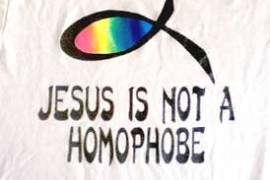
LGBT Rights Organizations Join Amnesty International in Call to Decriminalize Sex Work
Blog Search
Today, several LGBT rights organizations across the country issued the following joint statement in support of Amnesty International’s August 11th resolution supporting sex worker human rights.
Joint Statement in Support of Amnesty International Resolution:
As LGBT rights organizations in the United States, we join to applaud and support Amnesty International’s recent resolution to protect the human rights of sex workers by calling for decriminalization of sex work, while simultaneously holding states accountable in preventing and combatting sex trafficking, ensuring that sex workers are protected from exploitation, and enforcing laws against the sexual exploitation of children.
For many LGBT people, participation in street economies is often critical to survival, particularly for LGBT youth and transgender women of color who face all-too-common family rejection and vastly disproportionate rates of violence, homelessness, and discrimination in employment, housing, and education.
Transgender people engage in sex work at a rate ten times that of cisgender women, and 13% of transgender people who experience family rejection have done sex work (source). Whether or not they participate in sex work, LGBT people are regularly profiled, harassed, and criminalized based on the presumption that they are sex workers, contributing to the high rates of incarceration and police brutality experienced by these communities. As Amnesty International has clearly set forth, its resolution takes into account the negative impact of criminalization on the safety of sex workers, and furthermore, states remain obligated to protect the human rights of victims of trafficking and can use criminal law to address exploitation (source and source).
When LGBT people are prosecuted for sex work, they face alarmingly high rates of harassment and physical and sexual abuse behind bars. One study found that 59% of transgender people in California men’s prisons report having experienced sexual assault while in custody (source). Alternative diversion program alternatives are frequently based on moral judgment, sending the message that there is something wrong with people who are just trying to survive, and do nothing to address the actual needs of sex workers, including those sex workers who might prefer to be doing other kinds of work.
Laws criminalizing sexual exchange—whether by the seller or the buyer—impede sex workers’ ability to negotiate condom use and other boundaries, and force many to work in hidden or remote places where they are more vulnerable to violence. Research and experience have shown that these laws serve only to drive the industry further underground, make workers less able to negotiate with customers on their own terms, and put those who engage in criminalized sex work at higher risk for abduction and sex trafficking. And as UNAIDS and the World Health Organization have recognized, criminalization also seriously hampers efforts to prevent and treat HIV/AIDS—efforts in which people involved in the sex trades are crucial partners.
We look forward to working together, with sex workers and sex workers’ rights advocates, and with Amnesty International, to replace laws that criminalize sex work with public policies that address sex workers' real economic and safety needs.
In solidarity,
Transgender Law Center
Gay & Lesbian Advocates & Defenders (GLAD)
Lambda Legal
National Center for Lesbian Rights
National Center for Transgender Equality




